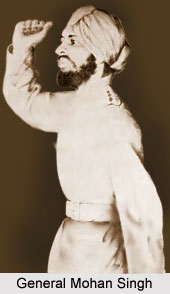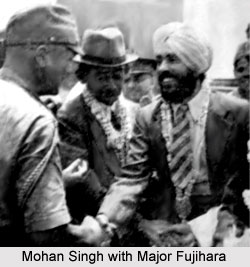 General Mohan Singh was an eminent Indian freedom fighter who contributed significantly in the Indian freedom struggle. He was also an Indian military officer and most celebrated for his part in leading and organizing the First Indian National Army (INA) in South East Asia during the Second World War. After the nation achieved independence from the British Empire in India, Mohan Singh served as a Member of Parliament in the Rajya Sabha (Upper House) of the Indian Parliament.
General Mohan Singh was an eminent Indian freedom fighter who contributed significantly in the Indian freedom struggle. He was also an Indian military officer and most celebrated for his part in leading and organizing the First Indian National Army (INA) in South East Asia during the Second World War. After the nation achieved independence from the British Empire in India, Mohan Singh served as a Member of Parliament in the Rajya Sabha (Upper House) of the Indian Parliament.
Early Life of Mohan Singh
Mohan Singh was born in the year 1909 in Ugoke village close to Sialkot (now in Pakistan) to the parents Hukam Kaur and Tara Singh. He was raised by his mother as his father died 2 months before his birth.
Military Career of Mohan Singh
After Mohan Singh completed his High School education, he was admitted to the 14th Punjab Regiment of the Indian Army in the year 1927. Later he received his recruitment training at Hrozpur and eventually Singh was posted to the 2nd Battalion of the Regiment, which was serving in the North-West Frontier Province at that time. He received a further 6 months training in Kitchener College in Nowgong, Madhya Pradesh, and was trained for two and a half years in the Indian Military Academy in Dehradun. He was commissioned in 1934 and was posted to the 2nd Border Regiment, a British unit, for a year. He was later posted to 1st Battalion of his previous 14th Punjab Regiment, which at Jhelum then.
During the Second World War, Mohan Singh was promoted as Captain when his battalion was assigned for operational service in the Far East. On 4 March 1941, he left with his unit for Malaya. Giani Pritam Singh, an Indian freedom fighter, and a Japanese officer named Major Fujihara requested Mohan Sing to form an Indian Army that would comprise of Indian soldiers captured as prisoners of war. Fujihara provided Singh with almost 40,000 Indian soldiers, who had surrendered to the Japanese Army. This was the initial step towards the construction of the Indian National Army.
Mohan Singh and Indian National Army
 After receiving support from Fujiwara, Mohan Singh gave up his oath to the British Crown and dedicated himself to the aim of Indian freedom. He started to contact various Indian members in the British Indian Army in South East Asia and began to recruit from among the Indians who were captured by the Japanese forces in Malaya. He took charge of all stragglers and Indian prisoners of war. This formed the core of the Indian National Army (INA). Mohan Singh requested the Indians to volunteer for the purpose of forming the Azad Hind Fauj or the Free India Army to fight against the British Government of India and to free the nation.
After receiving support from Fujiwara, Mohan Singh gave up his oath to the British Crown and dedicated himself to the aim of Indian freedom. He started to contact various Indian members in the British Indian Army in South East Asia and began to recruit from among the Indians who were captured by the Japanese forces in Malaya. He took charge of all stragglers and Indian prisoners of war. This formed the core of the Indian National Army (INA). Mohan Singh requested the Indians to volunteer for the purpose of forming the Azad Hind Fauj or the Free India Army to fight against the British Government of India and to free the nation.
Several Indians came forward and joined Mohan Singh`s force which was known as the Azad Hind Fauj or the National Army of independent India. It was established on 1 September 1942 and a total of around 40,000 volunteers had joined the Army. Mohan Singh was designated as a General and took command of the vast force. But later due to various conflicts with the Japanese army, General Mohan Singh was removed from his command and was detained by the Japanese Military Police and put into custody.
After the advent of Netaji Subhas Chandra Bose to the Far Eastern front from Germany, in June 1943, the Indian National Army revived under the form of Azad Hind Fauj. But, Mohan Singh could not be restored as the leader of the new Indian National Army.
Later Life of Mohan Singh
Later the British Indian Army took General Mohan Singh into custody and sent him back to India for his trial. But due to pressure incited the Indian National Army Red Fort trials; he was only dismissed from the Colonial Army. After the Indian independence and the partition of India, he came to India as a refugee and settled in Ludhiana. He became a member of the Indian National Congress Party and served as a legislator in Punjab. Subsequently, he became a member of the Rajya Sabha (Upper House) and served in the Indian Parliament.
Personal Life of Mohan Singh
In December 1940, General Mohan Singh got married to Jasvant Kaur at Secunderabad. Singh died on 26 December 1989 at Jugiana.






































